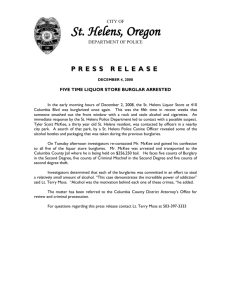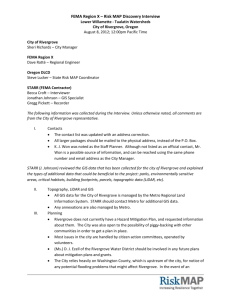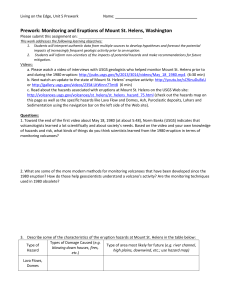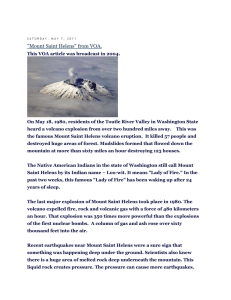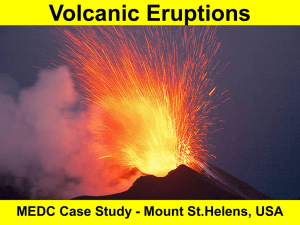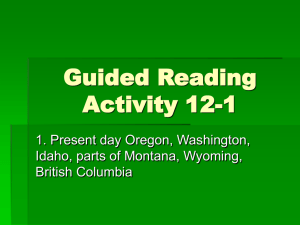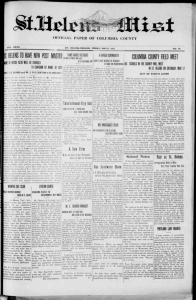FOR FEMA AND STATE REVIEW-MeetingMinutes
advertisement
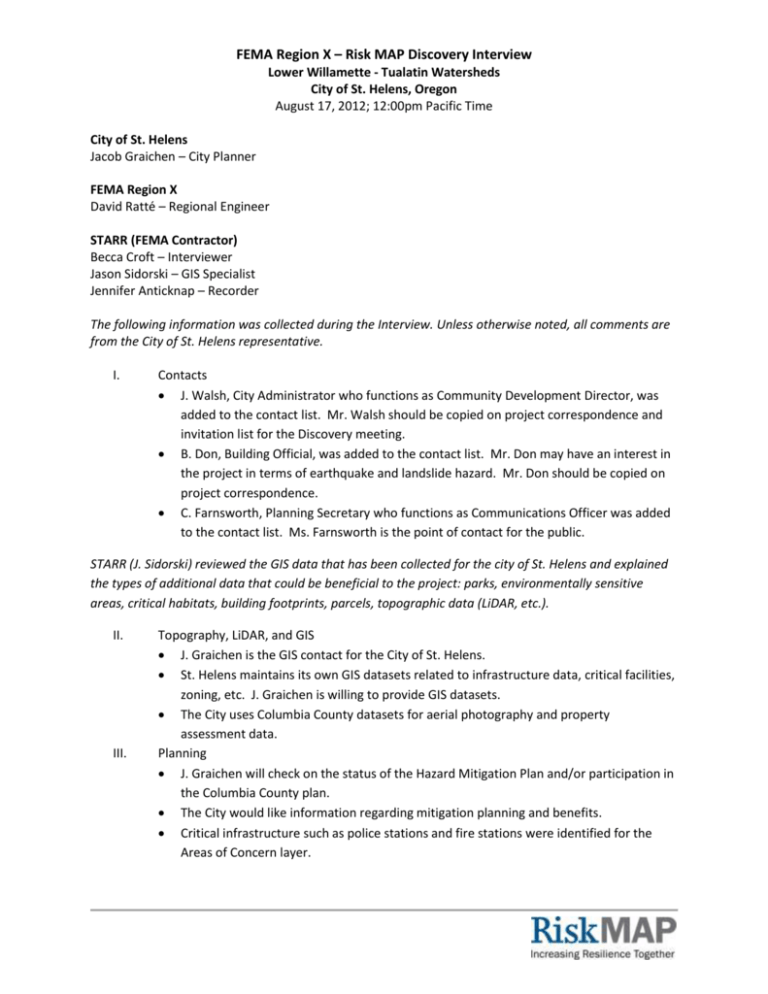
FEMA Region X – Risk MAP Discovery Interview Lower Willamette - Tualatin Watersheds City of St. Helens, Oregon August 17, 2012; 12:00pm Pacific Time City of St. Helens Jacob Graichen – City Planner FEMA Region X David Ratté – Regional Engineer STARR (FEMA Contractor) Becca Croft – Interviewer Jason Sidorski – GIS Specialist Jennifer Anticknap – Recorder The following information was collected during the Interview. Unless otherwise noted, all comments are from the City of St. Helens representative. I. Contacts J. Walsh, City Administrator who functions as Community Development Director, was added to the contact list. Mr. Walsh should be copied on project correspondence and invitation list for the Discovery meeting. B. Don, Building Official, was added to the contact list. Mr. Don may have an interest in the project in terms of earthquake and landslide hazard. Mr. Don should be copied on project correspondence. C. Farnsworth, Planning Secretary who functions as Communications Officer was added to the contact list. Ms. Farnsworth is the point of contact for the public. STARR (J. Sidorski) reviewed the GIS data that has been collected for the city of St. Helens and explained the types of additional data that could be beneficial to the project: parks, environmentally sensitive areas, critical habitats, building footprints, parcels, topographic data (LiDAR, etc.). II. III. Topography, LiDAR, and GIS J. Graichen is the GIS contact for the City of St. Helens. St. Helens maintains its own GIS datasets related to infrastructure data, critical facilities, zoning, etc. J. Graichen is willing to provide GIS datasets. The City uses Columbia County datasets for aerial photography and property assessment data. Planning J. Graichen will check on the status of the Hazard Mitigation Plan and/or participation in the Columbia County plan. The City would like information regarding mitigation planning and benefits. Critical infrastructure such as police stations and fire stations were identified for the Areas of Concern layer. Risk MAP Discovery Interview – Lower Willamette - Tualatin Watersheds City of St. Helens – August 17, 2012 IV. V. VI. VII. Page 2 of 4 The current Emergency Operations Center (EOC) for Columbia County was identified in the old courthouse building in downtown St. Helens, located outside of the project area. However, there is discussion between the City of St. Helens and Columbia County about moving the EOC to an area within the watershed next to the Columbia County 911 Center and the Columbia River Fire and Rescue Training Center. Both areas were noted in the Areas of Concern layer. There is a Capital Improvement Plan that addresses infrastructure. The City has been actively engaged in I&I project. Storm water lines need repair and updating to carry capacity. In areas where the Engineering department has made improvements to storm water infrastructure, localized flooding has been reduced. No specific areas were identified for future projects at this time. Earthquakes Earthquake risk should be discussed at the Discovery meeting. Wildfires The City participates in Columbia County’s Wildfire Hazard Plan. A portion of this plan specifically identified the Grey Cliffs area in the City of St. Helens (identified in the Areas of Concern, but outside of the project area). In this area there a mix of residential and flora and one access road to the community. The City did public outreach in this area to provide residents information on how to protect their homes and reduce their risk. Columbia County Forestry Department had a grant to address the urban-forest interface. Within the Grey Cliffs area the City did some public outreach to let residents know there were grants available under that program. Landslides There is no historical issue of landslide hazards in the city Most of the steep slopes in St. Helens are rock outcrops and the City has laws requiring geotechnical engineering take place as a condition of approval for new development. Severe Storms Ice storms are the main concern in the city as it hampers transportation. Snow events are of minimal concern. The City does not have snow plows in the fleet of city equipment. Snow events are rare but can cause emergencies if snow events are large enough to impact transportation corridors. J. Graichen does not recall any incidents of power outages or a need to open shelters during or after a storm event. The recent hot weather has brought need to open cooling shelters. The St. Helens Senior Center, identified on the Areas of Concern layer, has been opened as a cooling shelter. The City of St. Helens participates in the countywide CAN system for emergency alerts. The system sends text and phone messages. Risk MAP Discovery Interview – Lower Willamette - Tualatin Watersheds City of St. Helens – August 17, 2012 VIII. IX. X. XI. Page 3 of 4 J. Graichen will talk to communications officer about how the City gets emergency information to the residents. Flooding There are areas of localized flooding in areas where houses were built on historic wetlands. These areas are dotted throughout the city and were not identified. The City would appreciate a discussion at the Discovery Meeting about outreach materials that inform city residents in localized flooding areas of their options and benefits of having flood insurance. The City identified areas of concern for flooding (captured in the Areas of Concern layer). The east side of the city has an interesting geological history that makes it prone to flooding. Areas on the east side have a few inches of topsoil atop a hard basalt layer. This basalt layer is impervious resulting in overland flooding. No specific area was identified. The FIRM was updated in 2010; residents are asking questions as to why they are now in a floodplain when their properties and/or structures did not flood in the 1996 flood event. These areas were noted in the Areas of Concern layer. J. Graichen acknowledged outreach materials and support to help residents understand the map updates and risk would be helpful. In Zone A areas, background information may be necessary to help the City of St. Helens explain how the Base Flood Elevations (BFEs) were established and why the area is approximate. D. Ratté noted there is possibility to help redefine or reassess the Zone A areas. The City identified an area along the Willamette River (Multnomah Channel and Scappoose Bay) that could possibly be up for redevelopment. There is concern about development and no-rise certification for the area. The area has no floodway but Base Flood Elevations and the City would like assistance in what would be required by FEMA to redevelop this area (possible project identified to designate a floodway in this area). There is a second area of industrial land up for possible redevelopment (captured in Areas of Concern). Public Works officials (Sue Nelson and Neal Sheppard) may be better able to discuss flooding issues within the city Levees There are no levees identified in the city. Environmentally Sensitive Areas The City maintains a local wetland inventory. J. Graichen is willing to provide GIS data, as well as CAD drawing since GIS dataset may not be complete. Communications and Outreach J. Graichen acts as the Floodplain Administrator. Risk MAP Discovery Interview – Lower Willamette - Tualatin Watersheds City of St. Helens – August 17, 2012 Page 4 of 4 The City has a separate process for floodplain permitting. This process is called the Sensitive Lands Permit Process and addresses floodplain rules as required by FEMA. The process is separate from the building code/permitting process and also addresses slide hazards and wetlands. Local and county emergency services branches would be good possible partners for getting word out to residents about hazards in the area. The City would be interested in receiving tools and templates for hazard outreach. Status updates on this Risk MAP project would be welcome at City Council working sessions. The City would welcome training for floodplain management.
